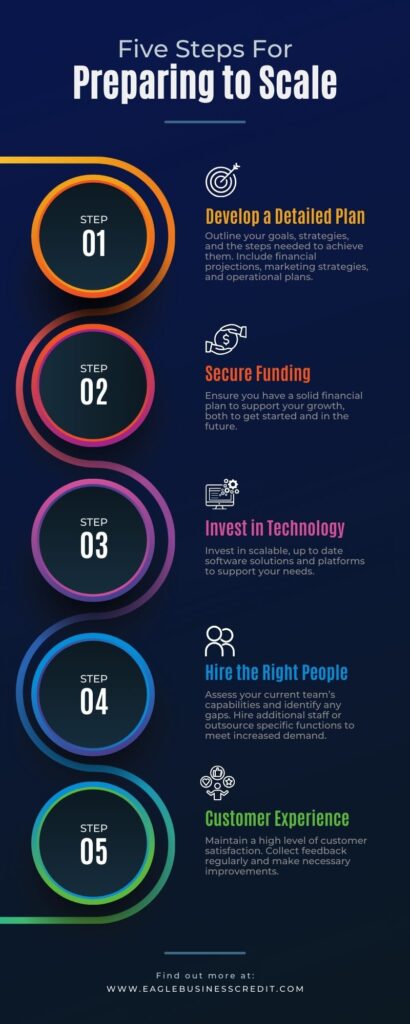Scaling a business is an exciting yet challenging phase that all business owners should prepare for. Scaling a business is a term that gets thrown around a lot in entrepreneurial circles, but what does it actually mean for the average small business owner?
Put simply, scaling your business means increasing your capacity to handle more business—whether that’s more customers, more sales, or a larger market presence—without a corresponding increase in operational costs. It’s also about growing sustainably and strategically and not just increasing the size of your operations. Knowing when and how to plan the process to scale your business is the next logical step after establishing a stable and profitable operation. This blog will explore when the right time to scale is, how to prepare for it, and the best practices for executing your scaling strategy effectively.
Understanding Scaling
Scaling differs from simple growth. Growth generally involves increasing revenue by adding resources at the same rate; for example, hiring more employees or expanding your physical locations to serve more customers. Scaling, on the other hand, focuses on increasing revenue without a proportional increase in costs. It means enhancing your business’s capability to grow by leveraging technology, improving processes, and optimizing resources.
Why Small Business Owners Need to Scale their Business Rather than Grow It
Meeting Increasing Demand: As your business becomes more successful, you will likely see an increase in demand for your products or services. Scaling allows you to meet this demand without compromising on quality or customer service.
Staying Competitive: In today’s dog eat dog world, staying the same can lead to losing out to more agile competitors. Scaling your business ensures that you stay competitive by continuously improving and innovating where it makes sense.
Maximizing Profitability Potential: Scaling helps you increase your revenue while keeping costs relatively stable. This improved efficiency can significantly boost your profit margins, allowing for reinvestment and further growth.
Expanding Market Reach: Scaling often involves expanding into new markets, whether geographically or by diversifying your product or service offerings. This expansion could open new revenue streams and reduce dependence on a single market.
Enhancing Business Value: For those that might want to sell their business in the future, a scalable business model is often more attractive to buyers. It demonstrates potential for growth and sustainability, increasing the business’s overall value.
Improving Operational Efficiency: Scaling necessitates streamlining operations and adopting new technologies. These improvements can lead to more efficient processes, reduced waste, and better use of resources, all of which contribute to a stronger bottom line.
Understanding When to Scale
Determining the right time to scale your business is crucial. Scaling too soon or too late can have detrimental effects. Here are some signs that indicate your business might be ready to scale:
Consistent Revenue Growth: If your business has been experiencing steady revenue growth for several quarters, it may be a sign that the market demand for your products or services is strong and sustainable.
Stable Profitability: Ensure your business is reliably profitable before scaling. Scaling often requires significant investment, and it’s essential to have a financial cushion to support this expansion.
Capacity to Handle More Business: Evaluate whether your current infrastructure can handle increased demand. This not only applies to your employees, but also includes technology, supply chain, and operational processes.
Market Demand: Conduct market research to confirm that there is sufficient demand for your product or service before you look to expand. This can be done through surveys, focus groups, or analyzing industry trends.
Operational Efficiency: Your business processes should be efficient and scalable. If you’re already struggling to cope with current demand, scaling will likely exacerbate these issues and may even cause you to fail spectacularly.
Preparing to Scale
Once you’ve determined that your business is ready to scale, it’s essential to prepare adequately. Here’s how you can lay the groundwork for successful scaling:
Develop a Detailed Plan: Create a comprehensive scaling plan that outlines your goals, strategies, and the steps needed to achieve them. This should include financial projections, marketing strategies, and operational plans.
Secure Funding: Scaling will, most likely, require additional capital in one form or another. Explore various funding options such as loans, lines of credit, venture capital, or reinvesting profits. Ensure you have a solid financial plan to support your growth, both to get started and in the future. You’ll need ongoing working capital to meet your everyday cash flow needs.
Invest in Technology: Technology can significantly enhance your ability to scale efficiently. Invest in scalable, up to date software solutions that can automate processes, improve customer service, and provide valuable data insights. You don’t want outdated technology that may cease to operate properly as you expand.
Hire the Right/ Enough People: A strong team is essential for successful scaling. Small business owners are famous for wearing many hats to get the job done. This will not be possible as you scale your business. Assess your current team’s capabilities and identify any gaps. Consider hiring additional staff or outsourcing specific functions to meet increased demand.
Enhance Operational Processes: Review and streamline your operational processes to ensure they can handle increased volume. This may involve upgrading your supply chain, improving inventory management, or optimizing production processes.
Focus on Customer Experience: As you scale, maintaining a high level of customer satisfaction is crucial. Implement systems to ensure consistent and high-quality customer service. Collect feedback regularly and make necessary improvements.

Best Practices for Scaling Your Business
Scaling a business is a complex process that requires careful execution. Here are some best practices to help you scale successfully:
Start Small: Begin with small, manageable steps rather than trying to scale all at once. Test your strategies on a smaller scale to identify potential issues and make necessary adjustments.
Set and Monitor Key Metrics: Keep a close eye on key performance indicators (KPIs) such as revenue growth, customer acquisition costs, and customer retention rates. Use these metrics to assess the effectiveness of your scaling efforts and make data-driven decisions.
Maintain Flexibility: The business landscape is constantly changing, and flexibility is key to adapting to new challenges and opportunities. Be prepared to make changes and pivot your strategies if needed.
Leverage Partnerships: Strategic partnerships can provide valuable resources and support for scaling your business. Look for partners that you can work with to help expand your reach, supplement your offerings, or streamline your operations.
Prioritize Quality Over Quantity: While it’s tempting to focus on rapid growth, maintaining the quality of your products or services is crucial. Scaling should not come at the expense of compromising quality, as this can harm your brand reputation and lead to losing your customers.
Invest in Marketing: Effective marketing is essential for reaching new customers and driving growth. Develop a robust omni-marketing strategy that includes digital marketing, social media, content marketing, and other channels to expand your reach.
Focus on Core Competencies: Identify your business’s core competencies and focus on strengthening them. This will help you maintain a competitive edge as you scale.
Seek Expert Advice: Scaling a business can be complex and seeking advice from experts can be invaluable. Consider working with business consultants, mentors, or industry experts to help guide your scaling efforts.
Build a Strong Company Culture: A positive company culture can significantly impact your scaling efforts. Foster a culture of innovation, collaboration, and continuous improvement to keep your team motivated and aligned with your growth objectives. Having your team involved greatly increases your chance of success.
Plan for the Long Term: While short-term goals are important, keep an eye on the long-term vision for your business. Develop strategies that not only support immediate growth but also lay the foundation for sustained success. Prepare financial forecasts every year that include expectations for the next two or three years to help keep focused on where you are going.
Secure Funding: Determine how much capital you’ll need to support your scaling efforts and explore funding options. This might include seeking investors, applying for loans and lines of credit or other methods of funding that might be available to you. Remember 82% of failed businesses cited poor cash flow management as the main reason they didn’t make it *. Don’t run out of money. Cash flow is the lifeblood of your business.
Conclusion
Scaling your business is an exciting journey that requires careful planning, preparation, and execution. By understanding when to scale, preparing adequately, and following best practices, you can navigate this challenging phase successfully. Remember that scaling is not just about growing bigger; it’s about growing smarter and sustainably. Stay focused on your goals, remain flexible, and continually seek opportunities to improve and innovate. With the right approach, you can achieve sustainable growth and take your business to new heights.

